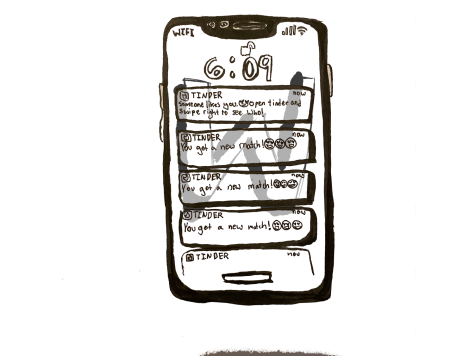Tinder and the Job Hunt
February 25, 2016
College students from all class years dread hearing a certain question from family and peers: What are your plans come May?
As I slog through February wishing I’d been productive over winter break, it finally sets in…‘tis the season to get my act together. I made it to the Whitties Helping Whitties networking event and somehow successfully balanced a plate of hors d’oeuvres, a glass of water, a handshake and an intelligible conversation, but these accomplishments can only justify a finite number of personal pats on the back.
So why wasn’t I more productive? Why couldn’t I just suck it up and apply for a job or four?
Ever since it occurred to me that it’s time to figure out my summer and post-graduation plans, I’ve been paralyzed by one fear: rejection. The possibility has made even my initial Google inquiries in search of viable internships feel daunting. The feeling sets in before I’ve even dusted off my resumé or begun crafting a cover letter, let alone made any networking contacts or considered how to survive a summer of unpaid work.
Rumination on this anxiety has lead me to wonder about other situations in which I’ve experienced rejection—naturally I landed in the romantic realm. In a time of growing digital relationships, virtual dating is more common than ever before. But it turns out Tinder and job hunting have remarkably stark connections. Not because “bae” is going to offer me a job and solve all my problems, but because both situations allow us to learn to reject and be rejected time and time again.
Take a look at some of these statistics about Tinder:
-There are 50 million monthly Tinder users
-There are more than 1 billion profiles swiped per day
-There are only 12 million matches made per day
According to these stats, provided by Business Insider, the opportunity for rejection on Tinder is far greater than it might appear. Yet, despite the amount of rejection we could possibly encounter on Tinder, it’s still one of the most popular “lifestyle” apps on the market.
So why are we so much more comfortable with rejection in this setting? There are three principal reasons for this. The first is the instant gratification we feel from a match that drowns out the numerous rejections we slogged through for this small victory. Applying for a job or internship requires much more than the swipe of a finger and takes a considerable amount of time. The second major difference is that when we take the leap of faith to start a conversation with one of our matches and they decide they’re not interested, there’s little penalty because we have a sea of other matches to choose from. Rejection from a dream job hits a little closer to home. The third difference is that the long-term, future implications of a swipe are much different than the decisions made on our professional paths.
A simple cost-benefit analysis of the risk involved in applying for a job in light of the vast Tinder experience lends itself to a helpful conclusion: The more jobs you apply for, the higher your likelihood of acceptance becomes. This, however, is where the necessity for rejection comes into play. A person must be able to reject unsavory Tinder prospects, even though it reduces their chances of gratification from a match, because the long-term payout will not be as beneficial.
Handling rejection is a crucial skill for millennials whether we’re communicating virtually or in person.
Being afraid of putting effort into a job or internship application only to be rejected—or worse never get a response—is a major barrier to starting the process of looking for a job. It can seem like a painful process that may in fact lead to a summer of mind-numbing administrative work and debt from a high cost of living, unavoidable even when taking into account an unsubstantial Whitman internship grant. But the networking payout from a summer internship can quickly make all that worthwhile.
What we need to do is accept the inevitability of rejection. We need to understand that rejection is a risk, but a risk that will not kill us. We’ve all been rejected before and survived. We’re all going to be rejected some more on our quest for self-actualization. If you’re not being rejected, you’re doing yourself an injustice by failing to turn over all the stones and missing an opportunity to discover the gold lying under one of them.







